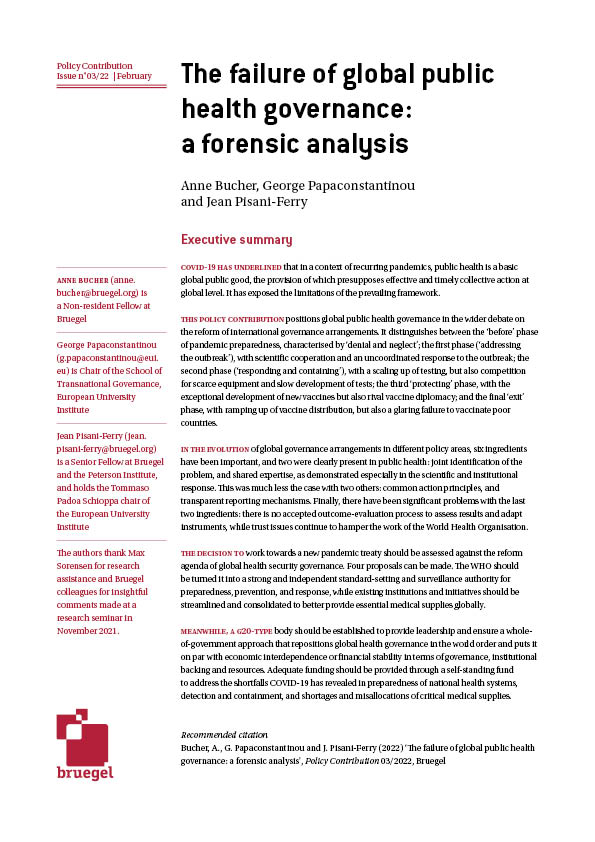Policy Contribution
The failure of global public health governance: a forensic analysis
The emergence of the Omicron variant in November 2021 was a stark reminder of the high overall cost of the persistence globally of extremely unequal access to vaccines and treatments. What are the reasons for these failures of global collective action?
The authors thank Max Sorensen for research assistance and Bruegel colleagues for insightful comments made at a research seminar in November 2021.
COVID-19 has underlined that in a context of recurring pandemics, public health is a basic global public good, the provision of which presupposes effective and timely collective action at global level. It has exposed the limitations of the prevailing framework.
This Policy Contribution positions global public health governance in the wider debate on the reform of international governance arrangements. It distinguishes between the ‘before’ phase of pandemic preparedness, characterised by ‘denial and neglect’; the first phase (‘addressing the outbreak’), with scientific cooperation and an uncoordinated response to the outbreak; the second phase (‘responding and containing’), with a scaling up of testing, but also competition for scarce equipment and slow development of tests; the third ‘protecting’ phase, with the exceptional development of new vaccines but also rival vaccine diplomacy; and the final ‘exit’ phase, with ramping up of vaccine distribution, but also a glaring failure to vaccinate poor countries.
In the evolution of global governance arrangements in different policy areas, six ingredients have been important, and two were clearly present in public health: joint identification of the problem, and shared expertise, as demonstrated especially in the scientific and institutional response. This was much less the case with two others: common action principles, and transparent reporting mechanisms. Finally, there have been significant problems with the last two ingredients: there is no accepted outcome-evaluation process to assess results and adapt instruments, while trust issues continue to hamper the work of the World Health Organisation.
The decision to work towards a new pandemic treaty should be assessed against the reform agenda of global health security governance. Four proposals can be made. The WHO should be turned it into a strong and independent standard-setting and surveillance authority for preparedness, prevention, and response, while existing institutions and initiatives should be streamlined and consolidated to better provide essential medical supplies globally.
Meanwhile, a G20-type body should be established to provide leadership and ensure a whole-of-government approach that repositions global health governance in the world order and puts it on par with economic interdependence or financial stability in terms of governance, institutional backing and resources. Adequate funding should be provided through a self-standing fund to address the shortfalls COVID-19 has revealed in preparedness of national health systems, detection and containment, and shortages and misallocations of critical medical supplies.
Recommended citation
Bucher, A., G. Papaconstantinou and J. Pisani-Ferry (2022) ‘The failure of global public health governance: a forensic analysis’, Policy Contribution 03/2022, Bruegel








